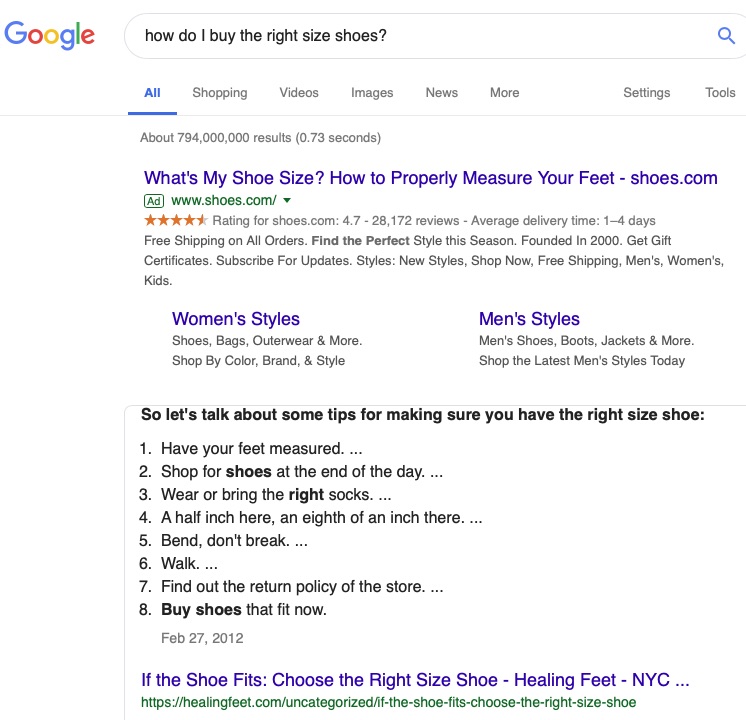Textual content enables search engines to understand your site. The words you choose should engage shoppers and boost your site’s relevance to the keywords and phrases that consumers search for.
If creating articles, blog posts, product descriptions, and other textual content strikes fear into your heart, try some of these tips to make writing easier, more engaging, and more optimal for natural search performance.
9 SEO Writing Tips
Jot down an outline. Listen to your high-school English teacher: Writing improves when you start with an outline. Begin with a list of thoughts you want to address. Pour them on the page without worrying too much about order, then organize.
First expel, then excel. Just start. Forget about quality, conciseness, and sentence construction. Toss your complete idea onto the page in all its run-on-sentence glory, and then cycle back to edit it into shape. Use one final edit to ensure the content highlights your keyword themes.
Consult keyword research. Keyword research provides the foundation for relevance, ensuring that the content you create resonates with your customers and prospects. It also generates content ideas. When you need ideas for your next content piece, turn to keyword research.
Discover questions that real people seek answers to. Uncover previously unknown niches. Identify the phrasings that consumers use when thinking about your products so that you can speak their language.
Keyword research takes effort, but it pays dividends for months.
Review competitors. Dissect the content you see on other quality sites to create your own view of a topic. Never plagiarize — although new, unused ideas are rare. For example, countless articles address the topic of this article: SEO content. The difference between articles comes from each author’s expertise, voice, and ability to relate her points to readers.
Provide value. No shopper wants marketing copy. Determine what your prospects seek and give it to them. Remember, keyword research identifies searchers’ desires. Use it to crack into what they value and give it to them.
Keep it simple. Unless your brand voice calls for lofty, highfalutin’ language, use clear, descriptive words. Flowery trademarked phrases typically make marketers happier than shoppers. If consumers need to think too hard about your text, they’ll likely shop elsewhere. Remember that many other sites express similar ideas and offer similar products to yours.
Embrace action words. Here again, your English teacher speaks the truth: Active verbs create engaging experiences for your visitors. Passive verbs drag content down, making it less engaging. Relegate the verbs “is,” “do,” and “have” to secondary roles in your vocabulary. Revise your sentences to demonstrate action.
However, balance this tactic with simple consumer-centric language. For example, say you identify in keyword research that many searchers want to know, “How do I buy the right size shoes?” Repeat that question on your site in the way they ask it, but answer it with active and engaging words. Restating the question also increases your chances of earning Google’s coveted Answer Boxes in position zero.

Addressing a question — such as “how do I buy the right shoe size?” — increases the chances of earning Google’s coveted Answer Boxes in position zero.
Nix pronouns. Pronouns lurk in sentences, stealing away keyword relevance by replacing thematically rich vocabulary with drab words like “it,” “these,” and “they.” Consider as an example the following sentences in a product description from a leading outdoor-gear brand:
Load Lifter Straps: These are stitched into the top of the shoulder straps, and they connect to the top of the pack frame. Ideally, they will form a 45° angle between your shoulder straps and the pack. Kept snug (but not too tight), they prevent the upper portion of a pack from pulling away from your body…
Replace one or two of the four bolded pronouns with “load lifter straps” or “the straps” to increase relevance and reduce repetition. Beware of overusing this tactic, however, as it could lead to spammy, unnatural text, which could result in search engines demoting your page.
Watch spelling, grammar. More writing tools exist now than ever before. Spelling and grammar errors create poor impressions from readers. Use spell check. That red squiggle underneath your word indicates a spelling or capitalization issue — right click for an instant fix. Click it every time you see it! When you’re done, spell check one last time.
Grammatical errors are a bigger challenge. Programs such as Microsoft Word resolve many of those as well. Even better, invest in Grammarly or a similar app. Download Grammarly’s free browser plugin. But the paid version is more robust. At $11 per month for an annual subscription, it’s worth the money.
